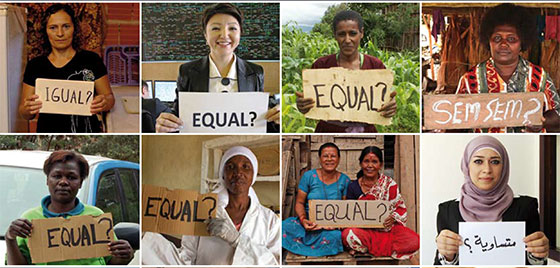Traditionally-Defined Cultural Roles for Women Slowly Change Over Time

This article appeared in the February 2016 issue of the print edition of THE TORCH as a part of the center spread feature titled “Gender Inequality Remains a Global Human Rights Concern.”
With feminism on the rise in the United States, the social, political, and domestic role of women is being explored and questioned. However, it’s not merely limited to the way countries treat their women.
Our world is filled with different religions, different cultures and different traditions for each culture. The role of women in each one varies. Some religions and cultures support the working independent woman, but others prefer the dependent domestic women.
Looking into the Arab cultures, the role of women before and after the introduction of Islam varies. Before Islam, women had no legal status. They were sold into marriages by the male figures of the family, and the husband was allowed to terminate the marriage at his will; the woman had no say whatsoever.
In pre-Islamic Arabia, the role of woman varied widely based on the laws and norms that were set by the tribes they lived in. In southern Arabia, for example, the role of women was determined by the religion they abided, but in the city of Mecca, where Muhammad was born, a tribal set of rights was placed.
When Islam was introduced in the Arab peninsulas in the seventh century, the status of women was improved among the tribes. Many of these improvements regarded marriage, divorce, and inheritance. Under Islamic law, marriage required the woman’s consent, and the dowry of a woman, which was previously considered her “price,” was now a present from her to her husband.
However, it wasn’t limited to Arab countries and Arab cultures. The role of women differed in religions adapted all over the world.
In Judaism, women received from God tasks different from those of men. Women have to fill a different role in the Jewish Society. Their roles in the Torah reflect the nature of a woman. They are expected to build and maintain a positive atmosphere at home, properly take care of it, and watch for the children’s health and education.
The man in Judaism is expected to provide a living for his family and his wife, and the wife is expected to maintain a healthy home life.
In Christianity, the presence of women has always been visible through art and stories. The role model of women in this religion is Mary, the mother of Jesus. The primary mission of women is motherhood. A women’s first role is to take care of and influence her children.
However, in Christianity, a woman can have the right of free choice, the state of life, and equal access to education and training. Christian women are encouraged to work in all areas of life, but it is preferred if they follow a path that works with their talents.
The roles of women in the various cultures are as varied as those cultures. Yet, in all of them, women tend to suffer some level of discrimination.





